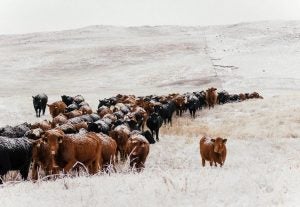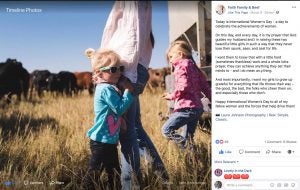Share your story. Be transparent. How many times have those in agriculture heard these sentences? Countless I am sure, but how many times has someone told you how to effectively do these things?
Terryn Drieling, NCBA’s 2018 Agriculture Advocate of the Year, addresses common misconceptions about advocating, shares her biggest mistakes, what she wished she had known, and more. Terryn manages the Faith Family & Beef blog, and the related accounts on Facebook, Instagram, and Pinterest, as well as an online store.
Misconception & Mistake #1: Overnight success
One of the biggest misconceptions surrounding agriculture advocacy is that consumers want to know where their food comes from. Well, that’s not the misconception. The actual misconception with this is that, because consumers are interested in where their food comes from, your site will be an overnight sensation.
“Here I was telling my story, and I fully expected people to show up in droves,” said Terryn. She had been told that consumers want to know where their beef comes from, so she thought they were going to flock to her site to learn. “Nobody showed up except family, friends, and peers in agriculture,” she said.
Steps to Avoid/Overcome Mistake #1
Terryn became a scheduled writer for a blog that was already reaching her primary audience, mothers that aren’t in agriculture. That helped her see what resonated with that audience — more specifically what subjects and types of posts people connected with, making them more popular. That led her to understand the second misconception and mistake about agriculture.

Misconception & Mistake #2: Only Talking About Agriculture
The second misconception is closely tied to the first. Thinking that consumers only want about to hear about agriculture. Terryn explained that she made this mistake for a while when she began advocating. Her second post was the love of caking, something that those of us in agriculture might want to read but doesn’t really draw in consumers.
“Agriculture is a part of you, but it’s not all of you,” said Terryn.
Steps to Avoid/Overcome Mistake #2
In theory, this is easy, but it can difficult to wrap your head around. It seems counterintuitive if you want to educate consumers about agriculture to not post about agriculture. But it helps build your audience and their trust.
“I started sharing things that had nothing to do with ranching and everything to do with mom life and faith. More people came in viewing my Facebook page for those posts, and then they stuck around for the agriculture posts,” she said.
Some of Faith, Family & Beef’s most popular posts have been about Terryn’s insecurities, her relationship with her husband, or just everyday struggles. It’s what her audience connects with — these things are topics that reach across producers and consumers.
“I wish someone had told me to share myself outside of agriculture sooner. You’re going to make more connections, and the right connections by doing it. Especially if you want to reach those outside of agriculture,” Terryn explained.

Misconception & Mistake #3: I Have Nothing in Common with Consumers
The third misconception is that you have nothing common with consumers. That’s a straight lie. If you look, you can find something that connects you, which is core to growing your audience and your influence with them.
“You have to let them get to know you and give them a reason to trust you. The way you do that is by sharing things you have in common with them. If you’re trying to reach people outside of agriculture, remember they probably don’t have agriculture in common with you, other than what they eat,” said Terryn.
This goes back to the second misconception about only being able to talk about agriculture, it’s not an effective way to reach those outside of agriculture. Find something to bridge the gap.
Steps to Avoid/Overcome Mistake #3
Terryn suggests writing things about your personal life and incorporate agriculture because it will help your readers connect not only with agriculture but with you as well.
Through Faith, Family & Beef, Terryn is focused on connecting with consumers as a Christian mother who wants healthy and safe food for her family. If you don’t have kids or don’t want to connect that way, you can use something else. People use fitness, fashion, coffee, technology, faith, anything that you’re interested in outside of agriculture. The biggest thing is, choose your bridge and work on building it.
“Be real, share the embarrassing stuff, share the hard stuff. Share the good stuff, but don’t limit it to the good stuff,” said Terryn. “The not ideal stuff makes you relatable and reminds people that you’re human.”

Misconception & Mistake #4: I Will Get Negative Comments/Trolls
We’ve all seen the fights that occur in the comment sections of social media posts. A lot of people are nervous about starting that by posting about agriculture. This misconception is slightly true: If you advocate long enough odds are, you’ll get negative comments. But they’re rarely as bad as our imaginations make them out to be.
“I’ve had very few negative comments on my pages over the last five years since I started,” said Terryn. She explained she had actually had more negative comments from fellow producers than from consumers.
Steps to Avoid/Overcome Mistake #4
This one is easy. Follow the golden rule. And remember your target audience when reading and responding to comments. Oftentimes the people who start the arguments on social media don’t fit into who you want to reach anyway.
“I may respond a bit, but finally I say we’re going to have to agree to disagree and have a nice day. I like the ‘Hide’ function for comments. I use it when the comments don’t fit my page audience,” explained Terryn.
The “Hide” function is beneficial on Facebook and Instagram, and you can also not approve comments on blogs. This isn’t always the answer, but if the comments become inappropriate or combative, sometimes it is the best option.
Overall Terryn’s advice for addressing negative comments and for advocating is this: “Don’t call people names, and don’t trash people. You don’t know what you don’t know. We all speak, act and do life from our own perspective,” Terryn said.
Michelle Bufkin is a freelance communication specialist whose goal is to help producers bridge the farm-to-plate knowledge gap that exists with consumers today. She uses her full-time position as the Membership and Communication Director at the Arkansas Cattlemen’s Association to interact with producers and work on building that connection.



